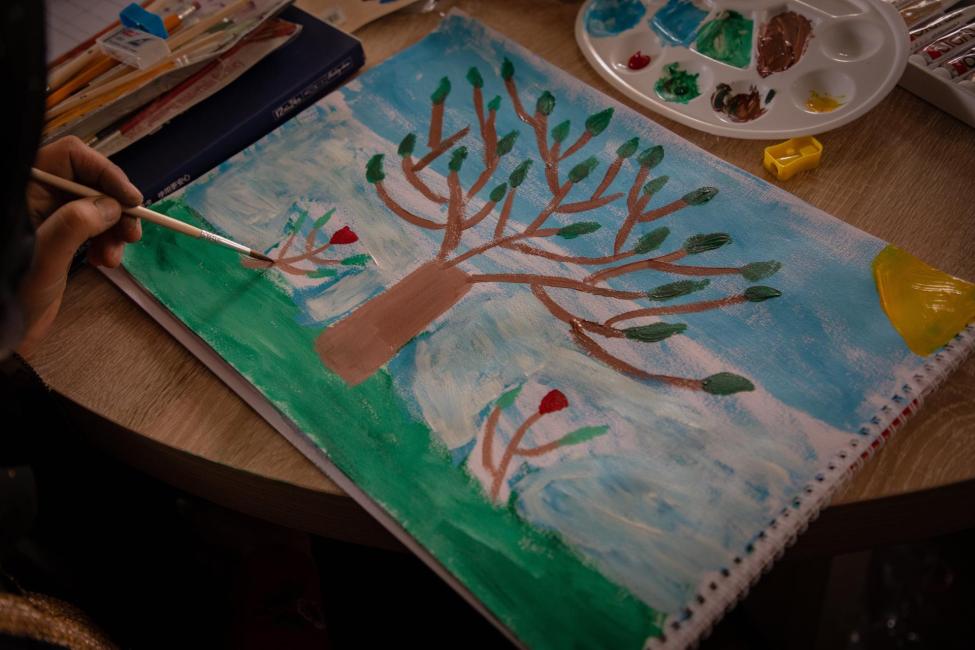-
Who We Are
WHO WE AREThe International Organization for Migration (IOM) is part of the United Nations System as the leading inter-governmental organization promoting since 1951 humane and orderly migration for the benefit of all, with 175 member states and a presence in over 100 countries. IOM has had a presence in Iraq since 2003.
About
About
IOM Global
IOM Global
-
Our Work
Our WorkAs the leading inter-governmental organization promoting since 1951 humane and orderly migration, IOM plays a key role to support the achievement of the 2030 Agenda through different areas of intervention that connect both humanitarian assistance and sustainable development. Across Iraq, IOM provides a comprehensive response to the humanitarian needs of migrants, internally displaced persons, returnees and host communities.
Cross-cutting (Global)
Cross-cutting (Global)
- Data and Resources
- Take Action
- 2030 Agenda
IRAQ, Ninewa – Silence prevailed inside Sarah's world: there were no sounds of her family's laughter, nor any music to sway to, or the sounds of the outside world. Only a life sentence of complete stillness, until colours sweetly crept into Sarah's world and converted the silence into a kaleidoscope of colours.
Sarah is a 19-year-old girl with a hearing disability who lives in the heart of Hassan Sham camp for internally displaced persons in Ninewa, northern Iraq. Every day, she faces the challenges of being deaf, such as being unable to attend school or communicate with the people around her, with courage and determination. However, her mother, Ekhlas, 40, tells us that she’s just like her sisters.
“At home, she’s the same as her sisters,” says Ekhlas. “She helps me and her sisters with all household chores, and her hobby is drawing. She is the happiest when she draws.”
Sarah has five brothers and three sisters, and despite her disability, Sarah has friends she communicates in sign language. With the help of her sisters, she learned sign language in the kindergarten in Hassan Sham camp.
Sarah’s family went through many hardships: they were displaced in 2017 from Hassan Sham village, and could not return to their homes, and struggled to communicate with the host community. It took some time, but somehow the family was able to integrate with the community of Hasan Sham camp.
Despite these difficulties and Sarah’s disability that isolated her from the world, art gave her solace. When she learned from her friends about the art sessions delivered at IOM’s Mental Health and Psychosocial Support centre inside the camp, she was excited to participate and practice her hobby and learn more. She enrolled in the 12-week long art therapy course that explored art theories, history and techniques and helped her express her thoughts through a new medium.
With time, Sarah started to find threads of connection with her surroundings through painting. With each brushstroke, Sarah poured her emotions onto the canvas, transforming negativity into vibrant bursts of blue, red, or green, and each colour reflected a feeling and formed what she wanted to say.
“We noticed a significant improvement in her psychological state once she started drawing,” adds Ekhlas. “She was smiling more often”.
The art sessions became Sarah’s sanctuary, where she could explore new techniques, experiment with different palettes, and unleash her creativity without barriers.
As Sarah honed the skills of her new hobby, her passion for art grew stronger, evident in her eagerness to attend each session and engage with her classmates more freely, she built connections with the other girls during the art sessions, a connection which will remain there even after the end of the course. Her family also witnessed a remarkable transformation in her demeanour, as joy radiated from her, and she became more confident and expressive as a young artist.
“We are so relieved for our daughter’s happiness. We finally found a way to make her happy,” shares Ekhlas.
After three months, the culmination of Sarah’s artistic journey came with the graduation exhibition held at the MHPSS centre on International Women’s Day. Alongside her fellow participants, Sarah proudly displayed her artworks, each piece a testament to her resilience and inner strength. As visitors marvelled at the beauty of Sarah’s creations, they were moved by the feelings Sarah’s expressed in each painting—the story of a young girl who refused to be confined by any disabilities and instead found her voice through the medium of art.
Sarah’s paintings captivated the audience, and to her family’s pride, every piece was sold. Each sale was not just a transaction but a recognition of Sarah’s talent and a celebration of her triumph over adversity. On that memorable day, as Sarah stood before her sold-out paintings, she felt a profound sense of accomplishment.
Through her art, Sarah had transcended the limitations imposed by society and proved that creativity knows no bounds. Sarah’s journey serves as a poignant reminder of the transformative power of art and the resilience of the human spirit. On World Creativity and Innovation Day, her story inspires us all to embrace our unique abilities, overcome obstacles, and unleash our creative potential to make the world a brighter place.
IOM's MHPSS activities at Hassan Sham U2 Camp are supported by U.S. Department of State: Bureau of Population, Refugees, and Migration (PRM).






